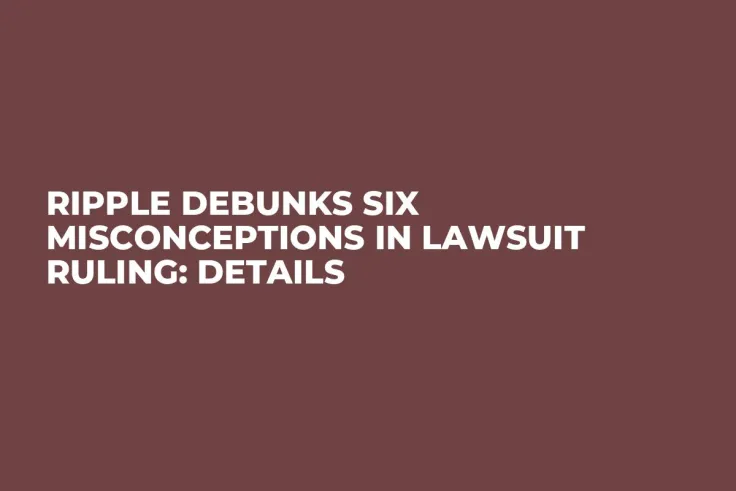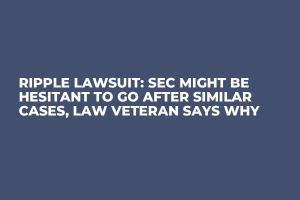
Disclaimer: The opinions expressed by our writers are their own and do not represent the views of U.Today. The financial and market information provided on U.Today is intended for informational purposes only. U.Today is not liable for any financial losses incurred while trading cryptocurrencies. Conduct your own research by contacting financial experts before making any investment decisions. We believe that all content is accurate as of the date of publication, but certain offers mentioned may no longer be available.
In a Q2, 2023, XRP Markets Report, Ripple sets the record straight on six misconceptions about the recent lawsuit ruling.
The first misconception that Ripple intended to dispel was that a decision is a split decision. Ripple emphasizes that the case has always been about clarifying the regulatory status of XRP in the United States.
Ripple has maintained that XRP is not a security since its inception, and the court has confirmed that position. As a result, the ruling is a huge victory for Ripple and the industry as a whole.
The second misperception, as expressed by some, is that the judgment states that XRP is a security in some contexts but not in others.
Ripple highlights a section of the judgment that states "XRP, as a digital token, is not in and of itself... an investment contract" and, hence, not a security. It explains that XRP does not magically change into a security except when coupled with promises.
The third misconception that Ripple wants to dispel is that a share of stock is always a security, so it makes no sense that certain XRP transactions are securities while others are not.
It was pointed out that the existence of an investment contract must be determined transaction by transaction. This is not the case with a traditional share of stock, which is always a security under the law.
Some have claimed that the Ripple ruling was wrong since it protects sophisticated institutions but not retail buyers; Ripple clarified this as the fourth misperception.
It was underlined that the court did not state that only sophisticated institutions and not retail buyers should be protected.
The court ruled on the SEC's jurisdiction, which terminates when there are no securities to regulate. Remember, there were no claims of fraud in Ripple's case, but there is fraud in other cases.
The sixth misconception that Ripple attempted to dispel is that the court ruling ruled against Ripple's fair notice defense. The court rejected Ripple's fair notice position for "institutional sales" solely, leaving open the fair notice defense for the other types of transactions at issue in the case.
According to the court, "the SEC's theories regarding the other sales in this case are potentially inconsistent with its enforcement in prior digital asset cases."
XRP enthusiast and lawyer Bill Morgan reacts to Ripple's recent report, which surprisingly focuses on Judge Torres' decision, stating: "The latest just released Ripple quarterly report not surprisingly focused on the Torres decision; Ripple did not miss in its trenchant criticism of the SEC, including its weaponization of the quarterly reports against Ripple."



 Dan Burgin
Dan Burgin Vladislav Sopov
Vladislav Sopov